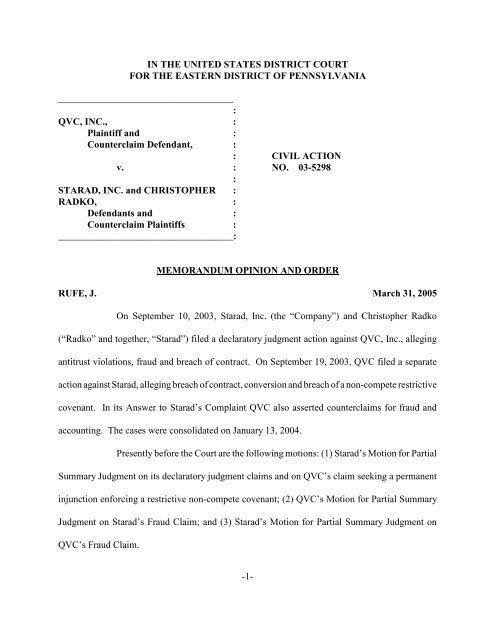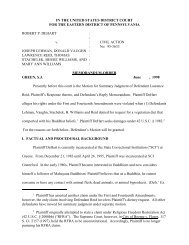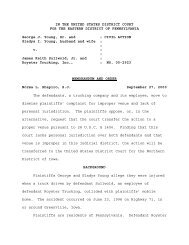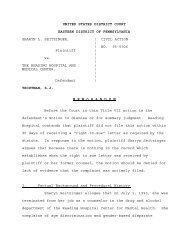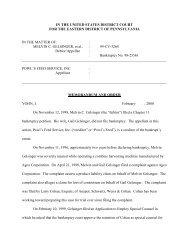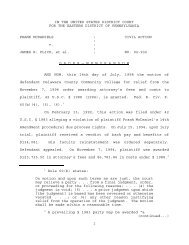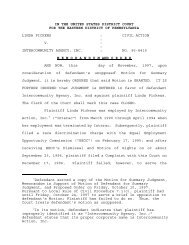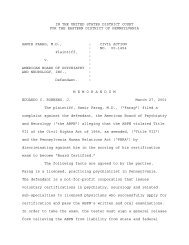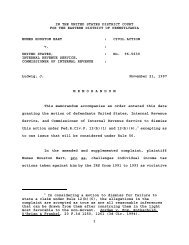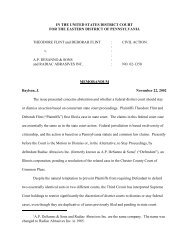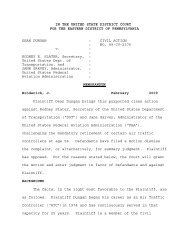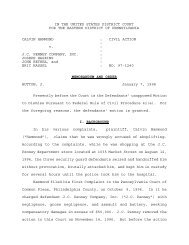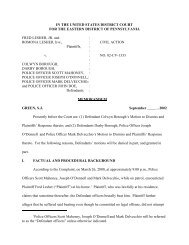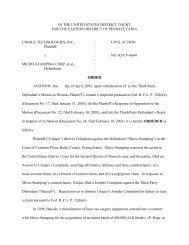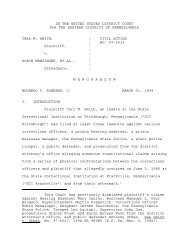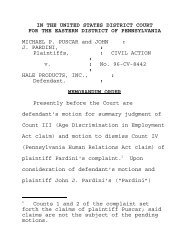united states district court - Eastern District of Pennsylvania
united states district court - Eastern District of Pennsylvania
united states district court - Eastern District of Pennsylvania
Create successful ePaper yourself
Turn your PDF publications into a flip-book with our unique Google optimized e-Paper software.
IN THE UNITED STATES DISTRICT COURT<br />
FOR THE EASTERN DISTRICT OF PENNSYLVANIA<br />
____________________________________<br />
:<br />
QVC, INC., :<br />
Plaintiff and :<br />
Counterclaim Defendant, :<br />
: CIVIL ACTION<br />
v. : NO. 03-5298<br />
:<br />
STARAD, INC. and CHRISTOPHER :<br />
RADKO, :<br />
Defendants and :<br />
Counterclaim Plaintiffs :<br />
____________________________________:<br />
MEMORANDUM OPINION AND ORDER<br />
RUFE, J. March 31, 2005<br />
On September 10, 2003, Starad, Inc. (the “Company”) and Christopher Radko<br />
(“Radko” and together, “Starad”) filed a declaratory judgment action against QVC, Inc., alleging<br />
antitrust violations, fraud and breach <strong>of</strong> contract. On September 19, 2003, QVC filed a separate<br />
action against Starad, alleging breach <strong>of</strong> contract, conversion and breach <strong>of</strong> a non-compete restrictive<br />
covenant. In its Answer to Starad’s Complaint QVC also asserted counterclaims for fraud and<br />
accounting. The cases were consolidated on January 13, 2004.<br />
Presently before the Court are the following motions: (1) Starad’s Motion for Partial<br />
Summary Judgment on its declaratory judgment claims and on QVC’s claim seeking a permanent<br />
injunction enforcing a restrictive non-compete covenant; (2) QVC’s Motion for Partial Summary<br />
Judgment on Starad’s Fraud Claim; and (3) Starad’s Motion for Partial Summary Judgment on<br />
QVC’s Fraud Claim.<br />
-1-
I. BACKGROUND<br />
A. The Ornaments<br />
The following facts are not in dispute. Starad markets and sells ornaments,<br />
decorative home accents and accessories for holiday celebrations and festivities, some <strong>of</strong> which are<br />
marketed and sold under the trademark “Christopher Radko.” The ornaments are exclusive designs<br />
<strong>of</strong> Starad. Radko is the Chief Executive Officer <strong>of</strong> the Company and the primary spokesperson for<br />
Starad products sold under the “Christopher Radko” trademark. QVC markets and sells products<br />
through direct response television programming, where customers can order products by various<br />
means, including by using toll free telephone numbers.<br />
From 1997 through 2003, QVC acquired Starad’s ornaments and home accessories<br />
via purchase orders and then marketed and sold this merchandise to its retail customers through,<br />
among other means, direct response television programming. QVC’s purchase orders did not contain<br />
any covenants restricting Starad’s right to market its products to other direct response television<br />
businesses.<br />
B. The Agreement<br />
On August 14, 2002, Starad and QVC entered into a license agreement (the<br />
“Agreement”) granting QVC exclusive and non-exclusive rights to promote certain Starad apparel.<br />
The Agreement granted QVC the license to manufacture and promote “novelty embellished sweaters<br />
based upon the ornament designs <strong>of</strong> Christopher Radko,” defining such sweaters as bearing<br />
trademarks and logos developed by Starad, including the words “Christopher Radko Goldstar,” and<br />
to use these trademarks to promote the sweaters.<br />
The Agreement also granted QVC the right to use Radko’s “name, likeness, image,<br />
-2-
voice and performance” to promote the sweaters. Starad agreed to provide QVC with all necessary<br />
design, consulting and advisory services and other creative input to promote the sweaters, and to<br />
develop samples <strong>of</strong> proposed sweaters. The Agreement obligated Radko, if requested by QVC, to<br />
appear at least four times a year on QVC programs during which the sweaters “may be <strong>of</strong>fered for<br />
sale.” However, QVC made no representations with respect to the number <strong>of</strong> such appearances it<br />
could request. Further, although QVC agreed to pay Starad royalties on net revenue sales <strong>of</strong> the<br />
sweaters, it made no representations regarding the number <strong>of</strong> sweaters it would purchase, the<br />
frequency that the sweaters would be <strong>of</strong>fered for sale by QVC, or <strong>of</strong> revenues to be generated from<br />
such sales.<br />
The Agreement also contained a non-competition clause prohibiting Starad from<br />
promoting (1) the sweaters anywhere in the United States through any media, and (2) “any goods,<br />
services, or products,” including the sweaters, on any direct response television program anywhere<br />
in the United States, i.e., on any <strong>of</strong> QVC’s rival networks. The non-competition clause lasted for<br />
the duration <strong>of</strong> the Agreement and for one year following its termination or expiration.<br />
The “Initial Term” <strong>of</strong> the Agreement commenced on August 14, 2002, and was set<br />
to expire one year after any sweater first aired on any QVC program. However, the Agreement<br />
automaticallyrenewed for nine one-year terms (“Renewal Terms”) unless (i) either party notified the<br />
other in writing <strong>of</strong> its intent to terminate, and (ii) net retail sales <strong>of</strong> sweaters during that term were<br />
less than the Minimum Amount. The Minimum Amount meant three million dollars in the Initial<br />
Term and for each Renewal Term, 110% <strong>of</strong> the Minimum Amount for the preceding term.<br />
Furthermore, if Starad elected to terminate the Agreement, it gave QVC a right to cure by purchasing<br />
or issuing orders for sweaters in quantities that, if sold during the then-current term, would yield net<br />
-3
etail sales above the Minimum Amount.<br />
On June 23, 2003, QVC issued its first purchase orders for the sweaters, totaling<br />
$46,311.00 (at cost). On July 14, 2003, Starad informed QVC that QVC’s failure to perform<br />
repudiated the Agreement and Starad considered the Agreement void and non-binding. QVC<br />
responded on July 21, 2003, pointing out that QVC made no representations in the Agreement<br />
regarding the number <strong>of</strong> sweaters it would purchase, and that QVC recently issued several purchase<br />
orders for the sweaters. QVC’s letter also averred that the Initial Term <strong>of</strong> the Agreement has not yet<br />
started because no sweaters had aired on any QVC program to date, that the Agreement was in full<br />
force, and that QVC expected Starad to honor its obligations.<br />
On August 26, 2003, Starad contracted with the Home Shopping Network (“HSN”),<br />
QVC’s competito r, to market the ornaments, and Radko has since appeared on HSN’s television<br />
programs. On September 8, 2003, Starad informed QVC that Radko would not appear on QVC’s<br />
television programs. On September 15, 2003, QVC sought to return $446,285 worth <strong>of</strong> ornaments<br />
to Starad for a cash refund.<br />
C. Starad’s Complaint<br />
Starad alleges that QVC entered into the Agreement to prevent Starad from selling<br />
the ornaments to QVC’s competitors. QVC splits the market for direct response television with three<br />
other entities, with QVC’s market share in excess <strong>of</strong> sixty percent. Its revenues are double those <strong>of</strong><br />
HSN, despite the fact that QVC’s “reach” (the number <strong>of</strong> homes to which its programming is<br />
distributed) is allegedly only six to seven percent larger than HSN’s reach. According to Starad,<br />
QVC’s market dominance results from its use <strong>of</strong> unreasonable and overly broad non-compete<br />
provisions in exclusive dealing agreements with its vendors.<br />
-4
Starad alleges that ornaments under Radko’s trademark are one <strong>of</strong> its main product<br />
lines, and that from 1998 through 2002 Radko appeared on QVC to market the ornaments. After<br />
discussing the potential for expansion <strong>of</strong> Starad’s “brand” into ready-to-wear products, QVC and<br />
Starad entered into the Agreement. During the negotiations QVC employees represented that the<br />
proposed Agreement and especially its non-compete provision were boilerplate and non-negotiable.<br />
Starad relied on QVC’s representations <strong>of</strong> its dedication to Starad’s brand when Starad executed the<br />
Agreement. At the same time that QVC was expressing its devotion to Starad’s brand, it was aware<br />
that sales <strong>of</strong> Starad’s brand had decreased and was allegedly planning to de-emphasize it.<br />
As <strong>of</strong> July 14, 2003, QVC allegedly had not aired any programming to promote<br />
Starad’s sweaters, purchased any sweaters, or paid any royalties to Starad. Starad contends that its<br />
July 14, 2003 letter to QVC validly terminated the Agreement.<br />
D. QVC’s Complaint<br />
QVC alleges that Starad breached the terms <strong>of</strong> QVC’s purchase orders for ornaments<br />
by refusing to refund QVC $929,000.00 for unsold ornaments which QVC properly returned in<br />
spring <strong>of</strong> 2003, and by subsequently refusing to accept ornaments QVC attempted to return in<br />
September <strong>of</strong> 2003. QVC further alleges that Starad knew Radko’s appearance “on air” was critical<br />
to QVC’s decision to purchase any ornaments, because Radko’s public persona is critical to<br />
successful marketing <strong>of</strong> his ornaments.<br />
QVC alleges that marketing <strong>of</strong> both the ornaments and the sweaters is intertwined<br />
because the sweaters are based on Starad’s unique ornament designs, and the Agreement’s non-<br />
compete provision governs promotion <strong>of</strong> the sweaters and promotion <strong>of</strong> other Starad products,<br />
including the ornaments. Relying on Radko’s promises to appear on QVC at least four times a year<br />
-5-
pursuant to the Agreement. and on Starad’s representations that Radko would so appear, QVC<br />
ordered $46,311.00 worth <strong>of</strong> sweaters and at least $1.5 million worth <strong>of</strong> ornaments. QVC could not<br />
sell this merchandise because Radko did not appear on-air as required by the Agreement. Thus,<br />
according to QVC, Starad breached the Agreement in August <strong>of</strong> 2003 when it contracted with HSN<br />
to market the ornaments, and in September <strong>of</strong> 2003, when it notified QVC that Radko would not<br />
appear on QVC to promote any products.<br />
II. STARAD’S MOTION FOR PARTIAL SUMMARY JUDGMENT ON ITS<br />
DECLARATORY CLAIMS<br />
Under Fed. R. Civ. P. 56(c), summary judgment is appropriate “if the pleadings,<br />
depositions, answers to interrogatories, and admissions on file, together with the affidavits, if any,<br />
show that there is no genuine issue as to any material fact and that the moving party is entitled to a<br />
judgment as a matter <strong>of</strong> law.” 1 In deciding a motion for summary judgment, all facts must be viewed<br />
and all reasonable inferences must be drawn in favor <strong>of</strong> the non-moving party. 2<br />
Starad argues that the Agreement is illusory and unenforceable because it leaves<br />
performance to the discretion <strong>of</strong> QVC, lacks consideration or, alternatively, that it was validly<br />
terminated by Starad. Starad also argues that the non-compete clause is unenforceable as a matter<br />
<strong>of</strong> law. 3<br />
A. Validity <strong>of</strong> the Agreement<br />
1 Celotex Corp. v. Catreet, 477 U.S. 317, 322-32 (1986).<br />
2 See Matsushita Elec. Indus. Co., Ltd. v. Zenith Radio Corp., 475 U.S. 574, 587 (1986).<br />
3 The Agreement provides, and the parties agree, that <strong>Pennsylvania</strong> law governs.<br />
-6
The Court must first determine whether the contract is ambiguous. 4 Where the<br />
written terms <strong>of</strong> the contract are not ambiguous and can only be read one way, the Court will<br />
interpret the contract as a matter <strong>of</strong> law. 5 The parties do not argue that the Agreement is ambiguous,<br />
and the Court agrees.<br />
1. Whether the Agreement Is Illusory<br />
First, Starad argues that the Agreement is illusory because QVC’s performance is<br />
discretionary. 6 When one party’s obligations under a contract are discretionary, those obligations<br />
are “illusory and, therefore, lacking consideration and unenforceable.” 7 As pointed out by QVC, the<br />
Agreement is not illusory because it sets out the parties’ mutual promises regarding a license<br />
agreement. Furthermore, under an exclusive dealing arrangement such as the one here, the buyer has<br />
a duty to use its best efforts to promote the seller’s product (and the seller has a duty to “use best<br />
efforts to supply the goods”). 8 Therefore, Starad is not entitled to summary judgment on this claim.<br />
4 Hullett v. Towers, Perrin, Forster & Crosby, Inc., 38 F.3d 107, 111 (3d Cir. 1994) (a contract<br />
provision is ambiguous if it is susceptible <strong>of</strong> two reasonable alternative interpretations).<br />
5 Id., 38 F.3d at 111.<br />
6 The Agreement at 2(c), 4(a) (QVC “makes no representations or warranties regarding (i) the number <strong>of</strong><br />
Products that QVC will purchase, if any, (ii) the frequency, if at all, that the Products will be <strong>of</strong>fered for sale by<br />
QVC, and (iii) the amount, if any, <strong>of</strong> revenues that will be generated from such sales,” how frequently Radko would<br />
appear on QVC to promote the Products, and reserved the right to promote products competing with the sweaters).<br />
7 Starr v. O-I Broadway Glass, Inc., 637 A.2d 1371, 1373 (Pa. Super. Ct. 1994).<br />
8 See Tigg Corp. v. Dow Corning Corp., 962 F.2d 1119, 1125 (3d Cir. 1992) (citing U.C.C. § 2-306(2)).<br />
Tigg applied Michigan law corresponding to Article 2 <strong>of</strong> the Uniform Commercial Code (the “U.C.C.”). Starad<br />
agrees that Article 2 <strong>of</strong> the U.C.C. applies to exclusive license agreements. See also 13 Pa. Cons. Stat. Ann. § 2306<br />
(corresponding to U.C.C. § 2-306); Starr, 637 A.2d 1371, 1373 (purchaser’s performance was not discretionary<br />
where it was contingent on his ability to procure property <strong>of</strong> a third party because the purchaser had a “duty to make<br />
reasonable efforts to bring about the transaction.”). Starad argues that even if QVC had obligations under the<br />
Agreement, QVC failed to use its best efforts because it issued purchase orders for less than one-sixth <strong>of</strong> the amount<br />
contemplated by the Agreement, ten months after its execution, while doing nothing to promote the sale <strong>of</strong> sweaters.<br />
While the parties present conflicting affidavits on the issue <strong>of</strong> QVC’s best efforts (Radko Aff. 20, 24; Becchelli<br />
-7-
2. Consideration<br />
Starad next argues that the Agreement is unenforceable because it lacks consideration.<br />
Under <strong>Pennsylvania</strong>’s Uniform Obligations Act (the “UOA”), the absence <strong>of</strong> consideration does not<br />
render the contract unenforceable if it contains a provision expressing the parties’ intent to be legally<br />
bound. 9 Here, the Agreement is signed by Starad, QVC, and Radko (in his personal capacity), and<br />
<strong>states</strong> that the parties “intend to be legally bound hereby.” 10 QVC and Starad also acknowledged<br />
receipt <strong>of</strong> other valid consideration, including promises <strong>of</strong> present or future royalties. 11 Further, a<br />
corresponding benefit or a beneficial change in the status <strong>of</strong> the parties’ relationship creates adequate<br />
additional consideration. 12 QVC presented affidavits <strong>of</strong> its employees which state that the<br />
Agreement was a result <strong>of</strong> QVC’s decision in 2002 to work with Starad on an effort to expand the<br />
Radko brand name from ornaments into apparel, and that QVC expended substantial resources on<br />
marketing and promoting Starad’s products, including working diligentlyon finalizing the sweaters’<br />
Aff. 3-5), this dispute does not affect the Court’s conclusion that the Agreement is not illusory.<br />
9 33 Pa. Cons. Stat. Ann. § 6.<br />
10 See Paul Revere Protective Life Ins. v. Weis, 535 F. Supp. 379, 368 (E.D. Pa. 1981) (guarantees signed<br />
by defendants “intending to be bound” were legally enforceable even if consideration was not found).<br />
11 The Agreement at C (“In consideration <strong>of</strong> the royalty paid or to be paid by QVC to [Starad], and for<br />
other good and valuable consideration, the receipt and sufficiency <strong>of</strong> which is hereby acknowledged, and intending<br />
to be legally bound hereby, the parties hereto agree as follows. . .” [emphasis added]). Starad argues that there was a<br />
failure <strong>of</strong> consideration because QVC failed to pay any royalties to Starad. However, QVC’s failure to pay any<br />
royalties is a defense available to Starad against QVC’s attempt to enforce the Agreement. Here QVC affidavits<br />
raise an issue <strong>of</strong> fact with regard to whether any problems with the sweater production (and by extension, with the<br />
payment <strong>of</strong> royalties) were due to Starad’s lack <strong>of</strong> cooperation. See Becchelli Aff. at 3-7; M.N.C Corp. v. Mount<br />
Lebanon Med. Center, 509 A.2d 1256, 1259 (Pa. 1986) (issue <strong>of</strong> failure <strong>of</strong> consideration is for the fact-finder).<br />
12 See Volunteer Firemen’s Ins. Serv. Inc. v. CIGNA Property & Cas. Ins. Agency, 693 A.2d 1330, 1338<br />
(Pa. Super. 1997) (adequate consideration for non-compete existed under a contract pursuant to which covenant<br />
insurer would act as exclusive underwriter <strong>of</strong> certain insurance policies developed by plaintiff insurance agency) .<br />
-8-
design. 13<br />
Even assuming that the parties’ expression <strong>of</strong> intent to be legally bound and<br />
acknowledgment <strong>of</strong> valid consideration does not render the Agreement enforceable, summary<br />
judgment is denied because QVC raises an issue <strong>of</strong> material fact regarding whether additional<br />
consideration was <strong>of</strong>fered for the non-compete provision, in a form <strong>of</strong> beneficial change in the<br />
parties’ relationship.<br />
3. Termination <strong>of</strong> the Agreement<br />
Starad first argues that the Agreement is indefinite in duration. The Initial Term <strong>of</strong><br />
the Agreement does not expire until one year after any Starad sweater airs on any QVC program.<br />
However, the Agreement does not set any deadlines for QVC to actually put the sweaters on air.<br />
Starad is therefore correct that lack <strong>of</strong> such a deadline creates a contract <strong>of</strong> potentially infinite<br />
duration.<br />
Starad then argues that its July 14, 2003 letter was a sufficient notice <strong>of</strong> termination. 14<br />
“‘Where the contract provides for successive performances but is indefinite in duration it is valid for<br />
a reasonable time but unless otherwise agreed may be terminated at any time by either party<br />
[emphasis added].’ Thus the plain language <strong>of</strong> the statute provides that such contracts will endure<br />
for a reasonable amount <strong>of</strong> time unless one party wishes to terminate sooner.” 15<br />
13 Campbell Decl. at 9; Becchelli Aff. at 3-7.<br />
14 Starad cites to cases where <strong>court</strong>s found that contracts were properly terminated by letters stating “we<br />
intend to cancel” or “we do not wish to continue this agreement in the future.” See EFCO Importers v. Halsobrunn,<br />
500 F. Supp. 152, 155-56 (E.D. Pa. 1980); Maloney v. Madrid Motor Corp., 122 A.2d 694, 696 (Pa. 1956). QVC<br />
contends that Starad referred to the Agreement as “void” and “non-binding” in its July 14, 2003 letter and not as<br />
“terminated” specifically to circumvent triggering the non-compete.<br />
15<br />
Norris Sales v. Target Div. <strong>of</strong> Diamant Boart, No. Civ. A. 01-6793, 2002 WL 31771169 at *3 (E.D. Pa.<br />
Dec. 11, 2002) (citing Pa. Cons. Stat. Ann. § 2309(b)).<br />
-9
The Agreement has specific provisions regarding termination by Starad. Even if<br />
Starad’s July 14, 2003 letter were a valid notice <strong>of</strong> termination, the Agreement gives QVC a right<br />
to cure by ordering sweaters in the amount that would generate three million dollars in revenue “if<br />
sold during such period” (i.e., during the then-current Term). Starad points out - and QVC admits -<br />
that QVC’s June 2003 sweater orders could not generate sales <strong>of</strong> more than one hundred thousand<br />
dollars. 16 Starad argues that this amount is “far less than the annual minimum sales volume <strong>of</strong> three<br />
million dollars required for renewal <strong>of</strong> the Sweater Agreement,” indirectly saying that QVC failed<br />
to cure.<br />
However, in a situation such as here, if QVC has not aired any sweaters on any <strong>of</strong> its<br />
programs, the Agreement creates a potentially infinite cure period because it allows QVC to cure by<br />
issuing purchase orders for the sweaters but fails to provide an actual deadline for achieving the three<br />
million dollar requirement. Contrary to Starad’s interpretation <strong>of</strong> the three million dollar<br />
requirement, it is not an “annual minimum” but has to be achieved during the then-current term,<br />
which under present circumstances can run indefinitely unless QVC puts any sweaters on air.<br />
QVC replies only that it would be nonsensical for QVC to behave in such a manner<br />
because it would violate covenants <strong>of</strong> good faith and dealing under <strong>Pennsylvania</strong>’s law. While it<br />
might be nonsensical for QVC to stock three million dollars worth <strong>of</strong> sweaters, the Agreement itself<br />
does not preclude such a possibility. Because the cure period is indefinite in duration, it should be<br />
valid for a reasonable time. 17 Affidavits <strong>of</strong> QVC employees represent that QVC’s delay in ordering<br />
the sweaters was due to lack <strong>of</strong> Radko’s cooperation, and the initial sweater orders were small for<br />
16 Radko Aff. at 24.<br />
17 See Norris Sales, 2002 WL 31771169, *3.<br />
-10-
usiness and marketing reasons. Since the termination provision does not render the Agreement per<br />
se invalid and genuine issues <strong>of</strong> fact exist as to whether Starad’s July 14, 2003 letter validly<br />
terminated the Agreement, summary judgment is denied. 18<br />
Starad alternatively seeks a declaration that the Agreement was valid for a reasonable<br />
time <strong>of</strong> one year, and terminated one year after its execution, on August 14, 2003 at the latest. Starad<br />
alleges that one year is a reasonable time in view <strong>of</strong> the one year Initial and Renewal Terms<br />
contemplated by the Agreement. While Starad is correct that the Agreement provides for one year<br />
Renewal Terms, the Initial Term, as described above, is potentiallyindefinite. Starad fails to provide<br />
any other evidence to support a finding that one year was a valid duration for the Agreement,<br />
precluding summary judgment on this claim.<br />
B. Validity <strong>of</strong> the Non-Compete Clause<br />
Under <strong>Pennsylvania</strong> law, a restrictive covenant is valid if it is “(1) ancillary to the<br />
main purpose <strong>of</strong> a lawful transaction; (2) necessary to protect a party’s legitimate interest; (3)<br />
supported by consideration; and (4) appropriately limited as to time and territory.” 19 Starad argues<br />
that the non-compete in the Agreement fails to satisfy any <strong>of</strong> these four prongs. 20<br />
18 See King <strong>of</strong> Prussia Equip. Corp. v. Power Curbers, Inc., 158 F.Supp.2d 463, 465 (E.D. Pa. 2001)<br />
(genuine issues <strong>of</strong> material fact existed as to whether agreement granting exclusive distributorship for manufacturer’s<br />
products had prescribed conditions, which if satisfied, set definite term <strong>of</strong> continuing duration, precluded summary<br />
judgment on breach <strong>of</strong> contract claim).<br />
19 Volunteer Firemen’s, 693 A.2d at 1337 (holding that a non-compete covenant between an independent<br />
insurance agency and an insurer prohibiting insurer from selling certain policies nationwide for three years after<br />
termination <strong>of</strong> the parties’ agreement was valid and enforceable).<br />
20 “The determination <strong>of</strong> reasonableness is a factual one, requiring consideration <strong>of</strong> all the facts and<br />
circumstances, with the party claiming unreasonableness as a defense against enforcement <strong>of</strong> the covenant bearing<br />
the burden <strong>of</strong> pro<strong>of</strong>.” Wellspan Health v. Bayliss, No. 405 MDA 2004, - - A.2d - -, 2005 WL 407523 (Pa. Super.<br />
Ct. Feb. 22, 2005) (<strong>court</strong> must engage in an analysis <strong>of</strong> reasonableness if the threshold requirement <strong>of</strong> a protectable<br />
business interest is met).<br />
-11
1. Ancillary<br />
QVC contends that the non-compete provision is ancillary to the main purpose <strong>of</strong> the<br />
Agreement because <strong>of</strong> the interrelationship between the sweaters and the ornaments. 21 The main<br />
purpose <strong>of</strong> the Agreement was to provide QVC with a license to use Starad’s intellectual property<br />
and Radko’s name and likeness, and to design and promote sweaters based on Radko’s ornament<br />
designs. QVC’s success in marketing the sweaters depended upon continued marketing <strong>of</strong> the<br />
ornaments, and Starad’s sales <strong>of</strong> ornaments on competitors’ direct television programming would<br />
adversely affect - - and already has affected - - QVC’s ability to market the sweaters by diverting<br />
viewers from QVC. 22 QVC also contends that the non-compete is necessary to protect QVC’s<br />
substantial investments in creation <strong>of</strong> Radko’s public persona and expansion <strong>of</strong> Starad’s brand. 23<br />
Starad argues that the non-compete is not ancillary to the main purpose <strong>of</strong> a lawful<br />
transaction because it far exceeds and/or is unrelated to the main purpose <strong>of</strong> the Agreement, which<br />
is a license to promote sweaters, while the non-compete purports to prohibit Starad from promoting<br />
“any goods, services, or products, including without limitation the Products, anywhere in the United<br />
States by means <strong>of</strong> Direct Response Television.”<br />
The controlling question is whether QVC “has a protectable interest such that a<br />
reasonable covenant not to compete, effective upon termination <strong>of</strong> the agreement, would be<br />
enforceable against [Starad]. . . It is only where the sole object <strong>of</strong> both parties in making the contract<br />
21 Campbell Decl. at 11.<br />
22 Id. at 11; see also Piercing Pagoda, Inc. v. H<strong>of</strong>fner, 351 A.2d 207, 212 (Pa. 1976) (under a franchise<br />
agreement for sale <strong>of</strong> earrings, a non-compete covenant faced “the economic reality that continued operation <strong>of</strong><br />
[franchisee’s] stores subsequent to the termination <strong>of</strong> the agreement would adversely affect the ability <strong>of</strong> the<br />
franchisor to secure another franchisee in the same territory.”).<br />
23 Campbell Decl. at 4-10; Morley Decl. at 4-9.<br />
-12-
is to restrain trade or control prices that the covenant will be declared void.” 24<br />
QVC’s affidavits raise issues <strong>of</strong> material fact regarding the interrelated marketing <strong>of</strong><br />
the ornaments and the sweaters and QVC’s interest in protecting its investments, precluding<br />
summary judgment for Starad on this issue.<br />
2. Consideration<br />
Starad next argues that because the sales <strong>of</strong> ornaments were never governed by non-<br />
compete covenants, new consideration would have been required to make the non-compete valid as<br />
to them. QVC responds that the new consideration was a beneficial change in Starad and Radko’s<br />
relationship with QVC. While Starad disputes that it received any benefits as a result <strong>of</strong> the<br />
Agreement, QVC’s affidavits describing its dedication <strong>of</strong> resources to the expansion <strong>of</strong> the Starad<br />
brand raise a genuine issue <strong>of</strong> material fact as to the existence <strong>of</strong> additional consideration. Summary<br />
judgment is therefore denied on this issue.<br />
3. Scope <strong>of</strong> the Non-Compete<br />
Starad contends that the non-compete is overly broad in both time and geographic<br />
scope. The non-compete lasts for the duration <strong>of</strong> the Agreement and for one year after termination<br />
<strong>of</strong> the Agreement. Its first subsection prohibits Starad from promoting the sweaters anywhere in the<br />
United States through any media. The second subsection <strong>of</strong> the non-compete prohibits Starad from<br />
appearing on any direct response television program anywhere in the United States, to promote “any<br />
goods, services, or products, including without limitation the Products.”<br />
24 Volunteer Firemen’s, 693 A.2d at 1337, n.7; see also Hess v. Gebhard & Co., 808 A.2d 912, 920-21 (Pa.<br />
2002) (“If the covenant is inserted into the agreement for some other purpose, as for example, eliminating or<br />
repressing competition or to keep the employee from competing so that the employer can gain an economic<br />
advantage, the covenant will not be enforced.”).<br />
-13
Since, as discussed infra, the Agreement is potentially infinite in duration, the non-<br />
compete is potentially infinite as well. This kind <strong>of</strong> duration is patently unreasonable and overly<br />
broad, and QVC fails to present any arguments to the contrary. Where the <strong>court</strong> finds that the<br />
restrictive covenant is overly broad but the party seeking its enforcement is clearly entitled to some<br />
protection, “the trial <strong>court</strong> has the power to grant only partial enforcement <strong>of</strong> the restrictive<br />
covenant.” 25 However, duration <strong>of</strong> the non-compete is directly related to the duration <strong>of</strong> the<br />
Agreement. As discussed previously, a genuine issue <strong>of</strong> material fact exists as to whether Starad’s<br />
July 14, 2003 letter validly terminated the Agreement. If the Court finds that the July 14, 2003 letter<br />
was a valid notice <strong>of</strong> termination, the non-compete would run for one year from the termination.<br />
Starad does not argue that a one year post-termination non-compete is unreasonable. Accordingly,<br />
summary judgment is denied on this issue.<br />
QVC also presents affidavits <strong>of</strong> its employees stating that a nationwide restriction on<br />
Starad’s direct response television programming is reasonable because that is the only geographic<br />
scope that could adequately protect QVC, and that Starad remains free to market its products in<br />
stores or on the internet without any restrictions. 26 QVC’s evidence creates issues <strong>of</strong> material fact,<br />
preventing the Court from granting summary judgment on this issue.<br />
4. Legitimate Need<br />
Starad contends that QVC has no legitimate business need for the non-compete with<br />
respect to any Starad and/or Radko products. As admitted by QVC, it bought Starad ornaments for<br />
25 QVC, Inc. v. Tauman, No. 98-1144, 1998 WL 156982 at *6 (E.D. Pa. Apr. 3, 1998).<br />
26 Campbell Decl. at 10; see also Tauman, 1998 WL 156982 at *3 (restrictive covenant valid where it did<br />
not wholly prevent defendant from pursuing his new business venture, or from marketing his new products).<br />
-14-
years via purchase orders that contained no non-compete language, and was able to generate sales<br />
<strong>of</strong> such ornaments between $6 million and $14 million. If sole ownership <strong>of</strong> Starad or Radko’s image<br />
and products were genuinely necessary to protect QVC’s business interests, it would have required<br />
such an agreement a long time ago, and it would not have been able to generate millions <strong>of</strong> dollars<br />
<strong>of</strong> sales <strong>of</strong> Starad merchandise. Relying on the reasoning in Tauman, QVC replies that the non-<br />
compete is necessary to protect QVC’s investment into the creation <strong>of</strong> Radko’s on-air personality<br />
and promotion <strong>of</strong> Starad’s products. 27 QVC did not insist on including non-compete clauses in its<br />
purchase orders for Starad ornaments. However, the <strong>Pennsylvania</strong> Supreme Court pointed out that<br />
requiring a restrictive covenant as part <strong>of</strong> an original employment agreement to be valid may be<br />
unreasonable under the circumstances, since a novice employee might not have any expertise worth<br />
protecting. 28 Therefore, the parties’ conflicting affidavits prevent summary judgment for Starad on<br />
this issue as well.<br />
5. Undue Hardship<br />
Starad argues that even if QVC could establish a legitimate business interest<br />
protected by the non-compete, the undue hardship on Starad justifies denying its enforcement. The<br />
ornaments are Starad’s major product line but represent less than two percent <strong>of</strong> QVC’s sales, and<br />
preventing Starad and Radko from selling their ornaments on direct response television would<br />
“decimate Starad’s sales, cause massive employee lay<strong>of</strong>fs and likely force Starad into bankruptcy.” 29<br />
27 Campbell Decl. at 4-10; Morley Decl. at 4-9; seealso Tauman, 1998 WL 156982 at *3 (finding a<br />
legitimate protectable interest where QVC invested significant resources in creation and promotion <strong>of</strong> certain<br />
products advertised by defendant and in creation <strong>of</strong> his on-screen persona).<br />
28 Jacobson & Co. v. Int’l Corp., 235 A.2d 612, 618 (Pa. 1967).<br />
29 Radko Aff. at 28.<br />
-15
QVC argues that this type <strong>of</strong> argument has been rejected as specious by <strong>court</strong>s in the context <strong>of</strong> non-<br />
compete cases. 30 Further, the only support for Starad’s argument comes from Radko’s Affidavit,<br />
which was drafted in opposition to QVC’s application for a temporaryrestraining order in September<br />
<strong>of</strong> 2003. Radko stated that Starad’s ability to sell ornaments in the “Fall holiday season” was<br />
“critical to Starad’s business” and accounted for approximately one-third <strong>of</strong> Starad’s annual sales. 31<br />
Since the end <strong>of</strong> the 2003 Christmas season, Starad has not submitted any additional pleadings or<br />
affidavits addressing the issue <strong>of</strong> undue hardship up to and including the present. It is undisputed that<br />
the non-compete here does not prohibit Starad from marketing or selling any <strong>of</strong> its products other<br />
than the sweaters in venues other than direct response television programming, such as via stores and<br />
the internet. A genuine issue <strong>of</strong> material fact with respect to the adverse impact <strong>of</strong> the non-compete<br />
on Starad’s sales prevents entry <strong>of</strong> summary judgment.<br />
Therefore, because contested issues <strong>of</strong> material fact exist, summary judgment on<br />
Starad’s Motion for Partial Summary Judgment on its declaratory judgment claims and on QVC’s<br />
claim seeking a permanent injunction enforcing a restrictive non-compete covenant is not<br />
appropriate.<br />
III. QVC’S MOTION FOR PARTIAL SUMMARY JUDGMENT ON STARAD’S FRAUD<br />
CLAIM<br />
QVC moves for partial summaryjudgment on Starad’s sixth cause <strong>of</strong> action for fraud,<br />
30 See Merrill Lynch v. Stidham, 658 F.2d 1098, 1102 n.8 (5th Cir. 1980) (“more specious is defendants’<br />
argument that because Merrill Lynch is a large concern, the injury is minuscule. One cannot be certain, but the<br />
success <strong>of</strong> Merrill Lynch may well be attributable to its diligence over the years in holding parties to the contracts<br />
that they freely executed.”).<br />
31 Radko Aff. at 28.<br />
-16-
arguing that it is a claim <strong>of</strong> fraud in the inducement barred by the parol evidence rule. 32 QVC argues<br />
that Starad relies on inadmissible parol evidence, mere allegations and inadmissible hearsay.<br />
Under <strong>Pennsylvania</strong> law, “the parol evidence rule bar[s] consideration <strong>of</strong> prior<br />
representations concerning matters covered in the written contract, even those alleged to have been<br />
made fraudulently, unless the representations were fraudulently omitted from the contract.” 33 This<br />
rule permits admission <strong>of</strong> prior representations where a party alleges fraud in the execution, such as<br />
where “the parties agreed that those representations would be included in the written agreement but<br />
were omitted by fraud, accident or mistake.” 34 Fraud in the inducement “does not involve terms<br />
omitted from an agreement, but rather allegations <strong>of</strong> oral representations on which the other party<br />
relied in entering into the agreement but which are contrary to the express terms <strong>of</strong> the agreement.” 35<br />
Starad responds that the parol evidence rule does not apply to its fraud claim because<br />
(1) Starad’s claim is based on QVC’s allegedly fraudulent representations about matters not covered<br />
by the Agreement, and (2) Starad alleged fraud in the execution as opposed to fraud in the<br />
inducement, an exception to the parol evidence rule. 36<br />
32 See Starad’s Compl. at 57, 58 (“QVC deliberately and actively misrepresented to [Starad] the status<br />
<strong>of</strong> the parties’ relationship and other facts material to the decision <strong>of</strong> [Starad] to enter into the Sweater Agreement<br />
and grant to QVC an exclusive license thereunder. [Starad] reasonably relied on this false information to its<br />
detriment, and [was] thereby induced to enter into the Sweater Agreement and grant to QVC an exclusive license<br />
thereunder.”)<br />
33 Dayh<strong>of</strong>f, Inc. v. H.J. Heinz Co., 86 F.3d 1287, 1300 (3d Cir. 1996).<br />
34 1726 Cherry St. P’ship v. Bell Atlantic Prop.’s, 653 A.2d 663, 666 (Pa. Super. 1995).<br />
35 Dayh<strong>of</strong>f, 86 F.3d at 1300.<br />
36 Starad also argues that summary judgment is inappropriate because it needs to conduct depositions <strong>of</strong><br />
QVC employees who submitted declarations to this Court, to explore the “factual dispute” regarding QVC’s<br />
employees’ representations to Starad about QVC’s devotion to Starad’s brand and the Agreement. Starad’s Reply in<br />
Opp. to QVC’s Mot. at 11; see also Starad’s Sur-Reply in Opp. to QVC’s Mot., at 9-10. Discovery is now<br />
completed, and neither party has moved this Court for leave to conduct additional discovery or to file supplemental<br />
-17
A. Whether QVC’s Alleged Misrepresentations Concern Matters Covered by the<br />
Agreement<br />
Radko’s Affidavit represents that Radko signed the Agreement in reliance on, “among<br />
other things, [QVC’s President, Darlene] Daggett’s representations regarding QVC’s dedication to<br />
the Christopher Radko brand, the [QVC] buyer [Joelle West]’s representation that a show would air<br />
in November 2002, and the representation that the relationship with QVC with regard to glass<br />
ornaments would remain unaffected.” 37<br />
QVC argues that all <strong>of</strong> the allegedly false representations by QVC that induced Starad<br />
to enter into the Agreement are exactly the type <strong>of</strong> pre-execution discussions barred by the parol<br />
evidence rule because they concern matters covered by the Agreement, an integrated written contract.<br />
Specifically, the Agreement addresses the issue <strong>of</strong> expanding Starad’s brand into apparel, 38 the<br />
scheduling <strong>of</strong> shows to promote sweaters, 39 and the second clause <strong>of</strong> the non-compete on its face<br />
applies to “any [Starad] goods, services, or products” and not just sweater-related products. 40<br />
pleadings addressing issues explored during discovery.<br />
37 Radko Aff. 12; see also Radko Aff. 8 (in early 2002 Daggett met with Radko “to discuss the potential<br />
for expanding the Christopher Radko brand to the ready-to-wear market,” and “repeatedly stressed the strength <strong>of</strong> the<br />
Christopher Radko brand and that QVC was devoted to assisting Starad in expanding the Christopher Radko<br />
brand”), 9 (QVC personnel pressured Starad to sign an allegedly standard licensing agreement for the sweaters so<br />
that QVC could complete its preparations for a show in November); 11 (Radko specifically told QVC’s counsel<br />
that he did not want the Agreement to apply to Starad’s ornament business and that he intended to negotiate a<br />
separate ornament agreement, whereupon he was reassured that the Agreement would not affect the parties’<br />
ornaments relationship; QVC’s counsel told Radko that the second part <strong>of</strong> the non-compete clause was meant to be<br />
read within the context <strong>of</strong> the first, as prohibiting Starad from direct response television sales <strong>of</strong> any sweater-related<br />
goods, services, or products).<br />
38 The Agreement at 1 (Agreement applies to promotion <strong>of</strong> “novelty embellished sweaters based upon the<br />
ornament designs <strong>of</strong> Christopher Radko” and grants QVC a license to use Radko trademarks to promote the<br />
sweaters).<br />
39<br />
The Agreement at 2(c) (QVC makes no representations or warranties regarding the frequency, if at all,<br />
that the sweaters will be <strong>of</strong>fered for sale).<br />
40 The Agreement at 6.<br />
-18-
41 1726 Cherry St., 653 A.2d at 664.<br />
42 Id. at 664-65.<br />
43 Id. at 670.<br />
Where the alleged misrepresentations concern a subject “specifically dealt with in the<br />
agreements,” the parol evidence rule precludes admission <strong>of</strong> evidence <strong>of</strong> allegedly fraudulent<br />
misrepresentations made during negotiations leading to the integrated written agreement. 41 The<br />
decision in 1726 Cherry St. is <strong>of</strong> particular relevance here. That case stemmed from the plaintiffs’<br />
sale <strong>of</strong> two parcels <strong>of</strong> land to the defendant Bell Atlantic Properties, Inc. The plaintiffs alleged that<br />
they agreed to be the first ones to sell to the defendant only after it agreed to the inclusion <strong>of</strong> a “most<br />
favored nation” clause in their written agreements. This clause provided that the price paid to the<br />
plaintiffs would be adjusted upward retroactively if the defendant later acquired certain enumerated<br />
parcels at higher prices. The list in question omitted a parcel known as the CIGNA parcel, which<br />
the defendant did later acquire at a price higher than that paid to the plaintiffs. The plaintiffs brought<br />
suit, alleging that the CIGNA parcel was not included in their list only because Bell Atlantic orally<br />
misrepresented to them that it had no intention <strong>of</strong> buying it. 42<br />
After concluding that the parol evidence rule barred the plaintiffs’ claims, the trial<br />
<strong>court</strong> entered judgment for the defendant. The <strong>Pennsylvania</strong> Superior Court subsequently affirmed,<br />
emphasizing that “although the parties disagree as to what was said on the subject <strong>of</strong> the CIGNA<br />
Parcel, all agree that the fate <strong>of</strong> that parcel specifically was discussed,” however, the final integrated<br />
writing made no mention <strong>of</strong> the CIGNA parcel. 43 Under these circumstances the parol evidence rule<br />
barred the plaintiffs from introducing evidence <strong>of</strong> prior allegedly fraudulent representations by the<br />
-19-
defendant. 44<br />
Since prior to the Agreement the parties’ only relationship involved sales <strong>of</strong> Starad<br />
ornaments, the Agreement, by expanding the parties’ relationship to include Starad apparel, clearly<br />
addresses the subject <strong>of</strong> expanding Starad’s brand. It also specifically addresses the number and the<br />
timing <strong>of</strong> shows promised by QVC (i.e., none). 45 Finally, by prohibiting Starad from selling any <strong>of</strong><br />
its products to QVC competitors for the duration <strong>of</strong> the Agreement, the non-compete directly affects<br />
Starad’s ornaments relationship with QVC. 46 The broad holdings <strong>of</strong> <strong>Pennsylvania</strong> <strong>court</strong>s interpreting<br />
the parol evidence rule and the plain language <strong>of</strong> the Agreement prohibit Starad from introducing<br />
evidence <strong>of</strong> alleged oral misrepresentations by QVC regarding QVC’s dedication to the Starad brand,<br />
a November 2002 show dedicated to the sweaters, and the Agreement not affecting the parties’<br />
ornaments relationship. As stated by the <strong>court</strong> in 1726 Cherry St., “if [Starad and Radko] intended<br />
to rely on what they now contend was a centrally important representation conveyed by [QVC] in<br />
the course <strong>of</strong> the negotiations over a multimillion dollar [] transaction, then [they] should have<br />
insisted that the representation be set forth in their integrated written agreement.” 47<br />
44 Id. at 670; see also Bardwell v. Willis Co., 100 A.2d 102, 105 (Pa. 1956)(“If plaintiffs relied on any<br />
understanding, promises, representations or agreements made prior to the execution <strong>of</strong> the written contract ..., they<br />
should have protected themselves by incorporating in the written agreement the promises or representations upon<br />
which they now rely, and they should have omitted the provisions which they now desire to repudiate and nullify.”)<br />
45 Starad’s argument that “a promise to air a show in November does not necessarily conflict with the<br />
parties’ agreement that shows would be scheduled according to no particular frequency” (Starad’s Reply in Opp. at<br />
5), does nothing to avoid the parole evidence rule and flies in the face <strong>of</strong> the Agreement, since QVC specifically<br />
disavowed any promises regarding future shows. See the Agreement at 2(c).<br />
46 Starad argues that the non-compete cannot affect the parties’ ornaments relationship because it was<br />
carried out via separate purchase orders and QVC does not contend that the Agreement replaces the purchase orders.<br />
That is not the point. While the non-compete does not subsume the parties’ ornaments relationship, it certainly does<br />
affect it by prohibiting Starad from selling its ornaments to QVC competitors.<br />
47 Id. at 670; see also Bardwell v. Willis Co., 100 A.2d 102, 105 (Pa. 1956)(“If plaintiffs relied on any<br />
understanding, promises, representations or agreements made prior to the execution <strong>of</strong> the written contract ..., they<br />
-20
Starad attempts to avoid the parol evidence rule by arguing that it pleaded fraud with<br />
respect to QVC’s misrepresentations <strong>of</strong> its overall devotion to the Starad brand and QVC’s plans to<br />
expand the brand. Starad argues that these matters are not covered by the Agreement because it is<br />
“only an exclusive license by Starad to QVC <strong>of</strong> the right to manufacture apparel based on Starad<br />
designs,” and therefore it does not (and cannot) address the status <strong>of</strong> the parties’ entire relationship<br />
and QVC’s plans for the Starad brand. 48<br />
However, Starad does not present any evidence supporting its claim that QVC’s<br />
President misrepresented QVC’s overall devotion to Starad’s brand while simultaneously deciding<br />
to de-emphasize the brand. 49 Radko’s Affidavit claims, in language identical to that <strong>of</strong> Starad’s<br />
Complaint, that at the time QVC employees were expressing QVC’s devotion to Starad’s brand, a<br />
“process was put into motion that would result in QVC deciding to ‘de-emphasize’ the Christopher<br />
Radko brand [emphasis added].” 50 Radko also represents that after he signed the Agreement,<br />
“QVC’s interest in marketing a Christopher Radko branded line <strong>of</strong> sweaters seemingly evaporated.” 51<br />
Specifically, in February 2003, QVC’s new buyer Mary Becchelli informed Starad that “QVC had<br />
no intention <strong>of</strong> airing a show for the new sweater line” and “QVC was ‘de-emphasizing’ the<br />
Christopher Radko brand.” 52 None <strong>of</strong> these assertions, even if taken as true, support an inference<br />
should have protected themselves by incorporating in the written agreement the promises or representations upon<br />
which they now rely, and they should have omitted the provisions which they now desire to repudiate and nullify.”)<br />
48 Starad’s Reply in Opp. at 6-7.<br />
49 Starad’s Sur-Reply in Opp. at 4.<br />
50 See Starad’s Compl. 26 (same).<br />
51 Radko Aff. at 13.<br />
52 Radko Aff. at 16.<br />
-21-
that QVC decided to de-emphasize Starad’s brand in the beginning <strong>of</strong> 2002, when QVC’s President<br />
Ms. Daggett allegedly stressed QVC’s devotion to Starad’s brand. 53<br />
When a motion for summary judgment is supported by affidavits, the party opposing<br />
summary judgment “may not rest upon the mere allegations or denials <strong>of</strong> the adverse party’s<br />
pleading, but . . . must set forth specific facts showing that there is a genuine issue for trial.” 54 Since<br />
Starad failed to show that there is a genuine issue as to any material fact, summary judgment on<br />
Starad’s fraud claim is appropriate.<br />
B. Fraud in the Execution<br />
Starad argues that an exception to the parol evidence rule applies because it alleged<br />
fraud in the execution. Starad signed the Agreement unaware that the non-compete governed the<br />
parties’ ornaments relationship, and that the Agreement imposed on Starad certain obligations related<br />
to the ornaments, despite the fact that such obligations are not found in the express language <strong>of</strong> the<br />
Agreement.<br />
“Fraud in the execution applies to situations where parties agree to include certain<br />
terms in an agreement, but such terms are not included. Thus, the defrauded party is mistaken as to<br />
the contents <strong>of</strong> the physical document that it is signing. Parol evidence is admissible in such a case<br />
only to show that certain provisions were supposed to be in the agreement but were omitted because<br />
<strong>of</strong> fraud, accident, or mistake.” 55 In Dayh<strong>of</strong>f, the plaintiff corporation claimed that its president,<br />
53 See Anderson v. Lib. Lobby, Inc., 477 U.S. 242, 255, 249-50 (1986) (evidence <strong>of</strong> the non-moving party<br />
is to be considered as true, and justifiable inferences are to be drawn in its favor, but summary judgment may be<br />
granted if the evidence is “merely colorable” or is “not significantly probative”).<br />
54 Fed. R. Civ. P. 56(e).<br />
55 Dayh<strong>of</strong>f, 86 F.3d at 1300; see also 1726 Cherry St., 653 A.2d at 666 (fraud in the execution is to be<br />
distinguished from fraud in the inducement, where the party does not contend that the parties agreed that the<br />
-22
unrepresented by counsel during negotiations with the defendant corporation, signed an agreement<br />
containing a termination clause in reliance on fraudulent misrepresentations about the meaning <strong>of</strong><br />
the termination clause. When the plaintiff’s president questioned the meaning <strong>of</strong> the termination<br />
clause, the defendant’s counsel gave him an explanation that differed from the plain language <strong>of</strong> the<br />
contract. 56 The Third Circuit held that the parol evidence rule precluded the plaintiff from<br />
introducing evidence <strong>of</strong> the defendant’s misrepresentations to alter the plain terms <strong>of</strong> the contract.<br />
In doing so, it also specifically rejected the plaintiff’s claim that it alleged fraud in the execution:<br />
“[i]t is clear that Dayh<strong>of</strong>f alleges fraud in the inducement in this case, despite its protestations to the<br />
contrary.” 57 QVC argues that in the present case it is clear that Starad alleged fraud in the<br />
inducement, and the exception to the parol evidence rule does not apply, because Starad’s claim is<br />
premised on prior, pre-Agreement representations.<br />
Starad does not allege that the parties agreed to include certain provisions in the<br />
Agreement and that such terms were omitted. Neither does Starad allege that Starad and Radko were<br />
mistaken as to the contents <strong>of</strong> the Agreement at the time they signed it. As described above, Starad’s<br />
pleadings and Radko’s affidavit allege misrepresentations by QVC employees regarding the effect<br />
<strong>of</strong> the Agreement on the parties’ ornaments relationship, made during negotiations leading to the<br />
Agreement. As in Dayh<strong>of</strong>f, Starad claims that the other party misrepresented the meaning <strong>of</strong> a<br />
contractual provision, despite the plain language <strong>of</strong> the contract at issue. Starad’s new argument that<br />
additional prior “representations would be in the written agreement, but claims that the representations were<br />
fraudulently made and that but for them, he or she never would have entered into the agreement.”).<br />
56 Dayh<strong>of</strong>f, 86 F.3d at 1299.<br />
57 Dayh<strong>of</strong>f, 86 F.3d at 1300.<br />
-23
QVC misled it regarding the nature and the scope <strong>of</strong> the Agreement as QVC now seeks to enforce<br />
it is misguided since it focuses not on the plain terms <strong>of</strong> the Agreement but on QVC’s personal<br />
interpretation there<strong>of</strong>. Starad clearly alleged fraud in the inducement and has failed to allege fraud<br />
in the execution, and therefore summary judgment on its fraud claim is appropriate for the reasons<br />
discussed above.<br />
IV. STARAD & RADKO’S MOTION FOR SUMMARY JUDGMENT ON QVC’S FRAUD<br />
CLAIM<br />
QVC has claimed that it purchased and/or refrained from returning ornaments in<br />
reliance on Starad’s misrepresentations. Starad contends that this is a claim <strong>of</strong> fraud in the<br />
inducement which is barred by the parol evidence rule. 58 QVC also claimed that it purchased the<br />
sweaters in reliance on Starad’s false representations regarding Radko’s appearances on QVC to<br />
promote the sweaters. Starad argues that this claim is barred under the <strong>Pennsylvania</strong> “gist <strong>of</strong> the<br />
action” rule, which bars fraud claims that merely restate a claim for breach <strong>of</strong> contract.<br />
A. QVC Purchases<br />
QVC does not dispute that through and including 2003, it purchased Starad ornaments<br />
using QVC’s purchase orders. 59 The purchase orders are integrated written documents which<br />
58 See QVC’s Answer and Counterclaims at 165-68 (alleging that Starad, in order to get QVC to<br />
purchase the sweaters and additional ornaments and to refrain from returning additional quantities <strong>of</strong> ornaments,<br />
knowingly made fraudulent omissions and material misrepresentations with regard to Radko’s continued appearances<br />
on QVC to promote the ornaments. QVC relied upon such fraudulent misrepresentations and/or material omissions<br />
in purchasing the sweaters and in purchasing additional ornaments and/or refraining from returning additional<br />
quantities <strong>of</strong> ornaments); id. at 76 (Radko’s appearance on QVC to promote Starad ornaments “was a critical factor<br />
in QVC’s decision to purchase any and all” ornaments from Starad); id. at 119 (Starad “fraudulently and<br />
intentionally omitted to inform QVC that Radko would not appear as an ‘on air’ spokesperson” on QVC’s programs<br />
to have QVC order the sweaters and additional ornaments, and to retain an additional inventory <strong>of</strong> ornaments.).<br />
59 See, e.g., QVC’s Answer and Counterclaims at 80; Campbell’s Second Decl. at 3.<br />
-24-
disclaim any oral modification. 60 Starad argues that QVC’s claim <strong>of</strong> reliance on Starad’s alleged oral<br />
promises, as far as it concerns QVC’s purchases <strong>of</strong> the ornaments, is precluded by the parol evidence<br />
rule. As discussed earlier, “the parol evidence rule bar[s] consideration <strong>of</strong> prior representations<br />
concerning matters covered in the written contract, even those alle ged to have been made<br />
fraudulently, unless the representations were fraudulently omitted from the contract.” 61 QVC does<br />
not claim that Starad’s alleged misrepresentations were fraudulently omitted from the purchase<br />
orders.<br />
QVC’s response essentially concedes that the parol evidence rule bars its claims <strong>of</strong><br />
fraudulent inducement to purchase merchandise under the purchase orders, stating that QVC does<br />
not claim that it was fraudulently induced to enter into the purchase orders. 62 Accordingly, QVC’s<br />
claim that it was fraudulently induced to purchase Starad ornaments by Starad’s oral<br />
misrepresentations is barred by the parol evidence rule, and summary judgment is appropriate.<br />
B. QVC Returns<br />
QVC now claims that Starad’s alleged misrepresentations, made after the purchase<br />
orders were executed, induced QVC to waive certain rights. QVC specifically argues that Radko<br />
knew that QVC believed he would appear on its programming to promote the ornaments, and that<br />
he waited as long as possible to inform QVC otherwise in order to induce QVC to waive certain<br />
60 See Paragraphs 18-19 <strong>of</strong> Ex. 3 to Campbell’s Second Decl. (providing that the orders “constitute the full<br />
understanding <strong>of</strong> the parties hereto and a complete and exclusive statement <strong>of</strong> the parties’ agreement concerning the<br />
Merchandise furnished hereunder,” and that no modification shall be binding unless “made in writing and duly<br />
executed by the party to be bound”). The purchase orders are conditioned upon acceptance by Starad <strong>of</strong> their terms<br />
and conditions, by oral or written notice <strong>of</strong> acceptance, preparation to perform, and/or shipment <strong>of</strong> all or any<br />
merchandise specified by the order. Id.<br />
61 Dayh<strong>of</strong>f, 86 F.3d at 1300.<br />
62 However, as evidenced by QVC’s Complaint and Counterclaims, QVC did initially make such a claim.<br />
-25
ights that it had under the purchase orders.<br />
63 See Starad’s June 4, 2003 letter, Ex. 4 to Campbell Second Decl.<br />
64 Campbell Second Decl. at 6, 8.<br />
65 Id. at 7.<br />
There are two specific transactions at issue. The first transaction involves<br />
$929,000.00 worth <strong>of</strong> ornaments which QVC bought and subsequently returned to Starad, exercising<br />
its right to return under Section Eight <strong>of</strong> its purchase orders. QVC alleges that Starad, strapped for<br />
cash, asked QVC to waive its right to a cash refund and instead accept a credit <strong>of</strong> $929,000.00 in<br />
ornaments to be provided for QVC shows in the fall <strong>of</strong> 2003. 63 QVC claims that it accepted Starad’s<br />
<strong>of</strong>fer <strong>of</strong> credit instead <strong>of</strong> a cash refund only because it believed that Radko would appear on QVC<br />
to promote the credited ornaments. 64 QVC believed so because Radko had appeared on its<br />
programming every year since the parties began doing business together, and because “until<br />
September <strong>of</strong> 2003, Radko’s statements and conduct indicated that he understood QVC expected him<br />
to appear on QVC’s programming to promote the [credited ornaments].” 65 QVC argues that Radko’s<br />
conduct is a clear cut case <strong>of</strong> fraud, and that the parol evidence rule does not bar evidence <strong>of</strong><br />
subsequent dealings between the parties. 66<br />
<strong>Pennsylvania</strong> law prohibits a party from modifying the terms <strong>of</strong> the parties’ written,<br />
integrated contract for the sale <strong>of</strong> goods. 67 Section Eight <strong>of</strong> QVC purchase orders gives QVC the<br />
66 QVC does not address applicability or construction <strong>of</strong> the U.C.C. in this situation, citing non-U.C.C.<br />
cases, even though Section Eight <strong>of</strong> QVC purchase orders specifically cites 13 Pa. Cons. Stat., Division 2, as<br />
governing sales and returns <strong>of</strong> merchandise under the orders. <strong>Pennsylvania</strong> codified the U.C.C. in 13 Pa. Cons. Stat.<br />
§ 1101 et seq.<br />
67 The purchase orders provide (and the parties agree) that <strong>Pennsylvania</strong> law governs. As contracts for the<br />
sale <strong>of</strong> goods, the purchase orders are governed by the <strong>Pennsylvania</strong> version <strong>of</strong> Article 2 <strong>of</strong> the U.C.C., Division 2 <strong>of</strong><br />
Title 13 <strong>of</strong> the <strong>Pennsylvania</strong> Consolidated Statutes. Specifically, 13 Pa. Cons. Stat. § 2202 prohibits evidence <strong>of</strong> oral<br />
-26
ight to return the ornaments to Starad “for credit or cash, at [QVC’s] option.” 68 It is an<br />
unambiguous provision, and it does not require Starad to appear to promote the ornaments. As<br />
discussed above, QVC purchase orders are integrated agreements constituting “the full understanding<br />
<strong>of</strong> the parties” and disclaiming any oral modification. QVC’s claim that it returned $929,000.00 <strong>of</strong><br />
ornaments for credit instead <strong>of</strong> cash in reliance on Radko’s false oral promises to appear to promote<br />
the credited ornaments is plainly barred under the <strong>Pennsylvania</strong> parol evidence rule. It attempts to<br />
modify the terms <strong>of</strong> an unambiguous provision without reducing the modification to writing, as<br />
required by the parties’ contract and the statute <strong>of</strong> frauds. 69 Further, as pointed out by Starad, if<br />
promises for Radko to appear on QVC were critical to QVC’s purchase and return decisions, QVC<br />
should have included them in its written agreements. 70 Therefore, summary judgment is appropriate<br />
for Starad on this issue.<br />
modification <strong>of</strong> a written contract intended by parties to be the final expression <strong>of</strong> their agreement.<br />
68 8 <strong>of</strong> Exs. 2-3 to Campbell Second Decl.<br />
69 13 Pa. Cons. Stat. § 2202 (evidence <strong>of</strong> subsequent dealings or course <strong>of</strong> performance may not be used to<br />
contradict the terms <strong>of</strong> a final writing, only to explain or supplement); see also 13 Pa. Cons. Stat. § 2209<br />
(modification <strong>of</strong> a contract must satisfy the statute <strong>of</strong> frauds). QVC claims that it is not attempting to modify the<br />
terms <strong>of</strong> its purchase orders, but that it was induced to waive certain rights under them. However, QVC’s right to<br />
return the ornaments for credit (or cash, at QVC’s option) was a right specifically spelled out by QVC’s purchase<br />
orders, which did not impose any conditions on QVC’s choice <strong>of</strong> remedies. QVC’s argument that in accepting credit<br />
instead <strong>of</strong> cash it relied on Radko’s alleged misrepresentations does attempt to modify the terms <strong>of</strong> the purchase<br />
orders.<br />
Agreement.<br />
The second transaction involves $884,684 worth <strong>of</strong> ornaments that QVC allegedly<br />
retained instead <strong>of</strong> returning to Starad based on the same belief that Radko would appear to promote<br />
the ornaments. QVC purchased these ornaments with “additional” purchase orders, presumably<br />
70 1726 Cherry St., 653 A.2d at 670. And in fact, QVC did include such a provision in the parties’<br />
-27
issued from February 2003 through July 2003. 71 QVC represents that after September 8, 2003, when<br />
Radko informed QVC that he would not be appearing on its programming, it exercised its right to<br />
return $446,285 worth <strong>of</strong> ornaments, but it was too late to return $884,684 worth <strong>of</strong> ornaments. 72<br />
This claim also seeks to modify clear and unambiguous terms <strong>of</strong> QVC’s purchase<br />
orders. QVC presents no evidence <strong>of</strong> a written modification <strong>of</strong> the purchase orders that would<br />
condition QVC’s return rights on alleged oral promises by Starad. Accordingly, this claim is barred<br />
by the parol evidence rule. 73 Summary judgment for Starad is appropriate on this part <strong>of</strong> QVC’s<br />
fraud claim as well.<br />
3. Gist <strong>of</strong> the Action<br />
Starad argues that under the Agreement Radko was contractually obligated to promote<br />
apparel, if requested to do so, and any claim that QVC purchased Starad sweaters in reliance on<br />
Radko’s duty to promote is barred by <strong>Pennsylvania</strong>’s “gist <strong>of</strong> the action” rule because it merely<br />
71 While it is not completely clear from QVC’s pleadings and affidavits as to when it purchased this<br />
merchandise, the “additional purchase orders” for $884,684 seem to be the same “additional purchase orders”<br />
referenced in QVC’s Answer and Counterclaims, even though the amount claimed is slightly different (“no less than<br />
$778,958.00.”).<br />
72 Campbell Second Decl. at 12.<br />
73 Additionally, QVC fails to provide any evidence as to the timing <strong>of</strong> its $884,684 ornaments purchase, or<br />
any explanation for why it could not exercise its return rights after September 8, 2003, relying on a conclusory<br />
statement by its employee that “if QVC had known at an earlier time that Radko did not intend to appear on QVC’s<br />
programming to promote the Holiday Ornaments, QVC would have exercised its right to return additional quantities<br />
<strong>of</strong> the $884,864. . .” Campbell Second Decl. at 12. QVC also curiously <strong>states</strong> that QVC believed that Radko<br />
would appear on its programming because “his statements and conduct indicated that he understood QVC expected<br />
him to appear,” yet represents that throughout the summer <strong>of</strong> 2003, when “QVC consistently tried to make<br />
arrangements for Radko to appear on QVC’s programming in September to promote the Holiday Ornaments,”<br />
“neither Radko nor anyone else at Starad returned [QVC’s] calls.” Id. at 7, 9. It is black letter law that in<br />
opposing summary judgment, the non-moving party may not rely on such mere allegations but “must set forth<br />
specific facts showing that there is a genuine issue for trial.” Fed. R. Civ. P. 56(e).<br />
-28
duplicates QVC’s contract claim. 74 QVC concedes as much but argues that it should be allowed to<br />
assert the fraud claim in the alternative to its breach <strong>of</strong> contract claim, in light <strong>of</strong> Starad’s argument<br />
that the Agreement is void and non-binding. This argument is not persuasive since, as pointed out<br />
by Starad, if the Agreement is void, so are any promises contained in it, including any promises by<br />
Radko to promote the sweaters, and QVC’s fraud claim would fail. Since QVC’s fraud claim for<br />
purchase <strong>of</strong> the sweaters duplicates its breach <strong>of</strong> contract claim, it is barred under the gist <strong>of</strong> action<br />
rule, and summary judgment for Starad is appropriate on this issue.<br />
An appropriate Order follows.<br />
74 See Montgomery County. v. Microvote Corp., Civ. A. No. 97-6331, 2000 WL 134708, at *3-4 (E.D. Pa.<br />
Feb. 3, 2000) (under <strong>Pennsylvania</strong> law, when the tort involves actions arising from a contractual relationship, the<br />
plaintiff is limited to an action under the contract).<br />
-29
IN THE UNITED STATES DISTRICT COURT<br />
FOR THE EASTERN DISTRICT OF PENNSYLVANIA<br />
____________________________________<br />
:<br />
QVC, INC., :<br />
Plaintiff and :<br />
Counterclaim Defendant, :<br />
: CIVIL ACTION<br />
v. : NO. 03-5298<br />
:<br />
STARAD, INC. and CHRISTOPHER :<br />
RADKO, :<br />
Defendants and :<br />
Counterclaim Plaintiffs :<br />
____________________________________:<br />
ORDER<br />
AND NOW, this 31st day <strong>of</strong> March, 2005, upon consideration <strong>of</strong> Starad’s Motion for<br />
Partial Summary Judgment on its declaratory judgment claims and on QVC’s claim seeking a<br />
permanent injunction enforcing a restrictive non-compete covenant [Doc. # 26]; QVC’s Motion<br />
for Partial Summary Judgment on Starad’s Fraud Claim [Doc. # 38]; Starad’s Motion for Partial<br />
Summary Judgment on QVC’s Fraud Claim [Doc. ## 44, 47]; the parties’ respective responses,<br />
replies, and sur-replies thereto; and for the reasons set forth in the attached Memorandum<br />
Opinion, it is hereby ORDERED as follows:<br />
1. Starad’s Motion for Partial Summary Judgment on its declaratory judgment<br />
claims and on QVC’s claim seeking a permanent injunction enforcing a restrictive non-compete<br />
covenant is DENIED.<br />
2. QVC’s Motion for Partial Summary Judgment on Starad’s Fraud Claim is<br />
GRANTED and JUDGMENT IS ENTERED in favor <strong>of</strong> QVC against Starad on Starad’s sixth<br />
-30-
cause <strong>of</strong> action for fraud.<br />
3. Starad’s Motion for Partial Summary Judgment on QVC’s Fraud Claim is<br />
GRANTED and JUDGMENT IS ENTERED in favor <strong>of</strong> Starad against QVC on QVC’s sixth<br />
counterclaim for fraud.<br />
It is so ORDERED.<br />
BY THE COURT:<br />
/s/ Cynthia M. Rufe<br />
_______________________________<br />
CYNTHIA M. RUFE, J.<br />
-31


